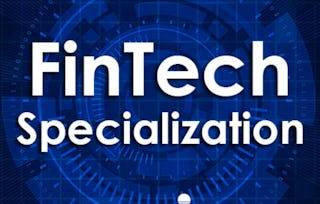This course “FinTech Disruptive Innovation: Implications for Society” help you understand how disruptive innovations create opportunity in finance industry and its impact to society especially your career. You would be able to examine and analyse how FinTech innovations would affect companies that relates to FinTech services and how it might affect your career in finance.

FinTech Disruptive Innovation: Implications for Society

FinTech Disruptive Innovation: Implications for Society
This course is part of FinTech: Finance Industry Transformation and Regulation Specialization

Instructor: Theodore Henry King CLARK
7,733 already enrolled
Included with
109 reviews
Skills you'll gain
Details to know

Add to your LinkedIn profile
See how employees at top companies are mastering in-demand skills

Build your subject-matter expertise
- Learn new concepts from industry experts
- Gain a foundational understanding of a subject or tool
- Develop job-relevant skills with hands-on projects
- Earn a shareable career certificate

There are 5 modules in this course
In this module, we will explore the nature of evolutionary versus revolutionary innovations and business transformations. Innovation disruption as a popular business concept will be examined in the context of the social and economic transformations enabled by FinTech innovations. A case example of peer to peer lending will be used to illustrate and explore these issues in a FinTech context.
What's included
6 videos3 readings1 assignment2 discussion prompts
FinTech innovations are not uniform in their impact on and adoption by different participants in the global economy. Differences in adoption, attitudes, and capabilities will be explored based on country, size, age, and access to capital or technology in an effort to better understand the likely pace of adoption and transformation that will result from FinTech innovations.
What's included
6 videos1 assignment1 discussion prompt
Predicting the future is easy, but being right in what you are predicting is hard. One challenge in regard to understanding the impact of change in the future is that the pace of change is often more important than the eventual nature of market evolution. If change is fast, large established firms are likely to be disrupted and face new competitors that will challenge prior industry structures. When change is slower, or more evolutionary in nature, large firms have time to adapt and thrive in spite of change (although it still may be hard to change culture, even if the changes are slow). In this module, we will examine both the evolution of FinTech markets and capabilities, and the likely pace of changes.
What's included
10 videos1 assignment1 discussion prompt
For many learners, the most important part of this course is going to be "so how will this affect me?" In this module, we will discuss and examine implications for both firms and individuals working in these types of firms for their future careers. Some conclusions might be unexpected, such as the risk-adjusted rewards for employees of large, innovative firms might be higher than the average returns in society for smaller startup employees (the founders might get rich, but employees of small firms do not always share in these riches). While it might be good to stay with a large financial services firm that is investing in and adapting to changes in the financial services industry, the skills that are needed to be successful in any career in financial services are likely to change in the future, and employees who are willing to invest in developing new skills and talents are more likely to success in the future.
What's included
6 videos1 assignment1 discussion prompt
This final project is designed to help you examine your own firm and your own career in the context of FinTech market innovations, and to develop a plan for improving your future career prospects and options.
What's included
1 video1 reading1 peer review1 discussion prompt
Earn a career certificate
Add this credential to your LinkedIn profile, resume, or CV. Share it on social media and in your performance review.
Instructor

Explore more from Finance
 Status: Free Trial
Status: Free TrialCopenhagen Business School
 Status: Free Trial
Status: Free TrialUniversity of Cape Town
 Status: Free Trial
Status: Free TrialCopenhagen Business School
 Status: Free Trial
Status: Free TrialThe Hong Kong University of Science and Technology
Why people choose Coursera for their career

Felipe M.

Jennifer J.

Larry W.

Chaitanya A.
Learner reviews
- 5 stars
87.27%
- 4 stars
8.18%
- 3 stars
2.72%
- 2 stars
0.90%
- 1 star
0.90%
Showing 3 of 109
Reviewed on Feb 8, 2019
It gives you a good overview of the topics you should study as a banker, to improve your market value.
Reviewed on Aug 19, 2021
Great Course, great content. Prof. Theodore Henry King Clark is one of the greatest teachers i ever came across. My gratitude to COURSERA and HKUST for the opportunity to participate in this course.
Reviewed on Jul 30, 2020
Good overview on the implications of Fintech in Financial industry and for self growth.

Open new doors with Coursera Plus
Unlimited access to 10,000+ world-class courses, hands-on projects, and job-ready certificate programs - all included in your subscription
Advance your career with an online degree
Earn a degree from world-class universities - 100% online
Join over 3,400 global companies that choose Coursera for Business
Upskill your employees to excel in the digital economy
Frequently asked questions
To access the course materials, assignments and to earn a Certificate, you will need to purchase the Certificate experience when you enroll in a course. You can try a Free Trial instead, or apply for Financial Aid. The course may offer 'Full Course, No Certificate' instead. This option lets you see all course materials, submit required assessments, and get a final grade. This also means that you will not be able to purchase a Certificate experience.
When you enroll in the course, you get access to all of the courses in the Specialization, and you earn a certificate when you complete the work. Your electronic Certificate will be added to your Accomplishments page - from there, you can print your Certificate or add it to your LinkedIn profile.
Yes. In select learning programs, you can apply for financial aid or a scholarship if you can’t afford the enrollment fee. If fin aid or scholarship is available for your learning program selection, you’ll find a link to apply on the description page.
More questions
Financial aid available,
¹ Some assignments in this course are AI-graded. For these assignments, your data will be used in accordance with Coursera's Privacy Notice.

